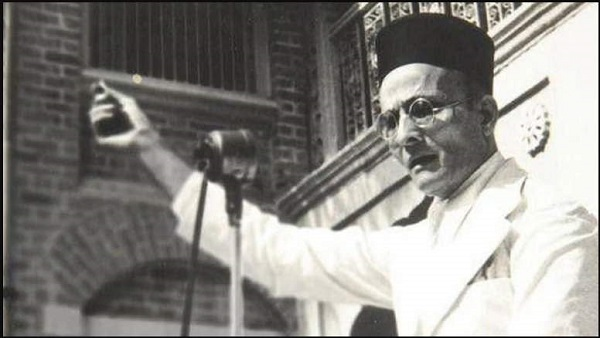Veer Savarkar and China- Part 1
27 Jul 2020 11:26:13
On recent background of conflict between India and China, let’s peep into history to know Veer Savarkar’s views on Chinese aggression.

Savarkar was a well-attentive and close watcher of happenings in the world from his young days. Even, the Indian revolutionaries of Abhinav Bharat (a revolutionary organization founded by Savarkar himself) were in touch with the revolutionary forces of Russia, Ireland, Egypt, and China. His famous book “The Indian War of Independence-1857” proscribed by British Authorities in India even before its publication, however, he managed to get it published secretly and copies of the book were sent to India, America, Japan, and China wrapped in artistic covers printed with innocuous and bogus names such as ‘The Posthumous Papers of the Pickwick Club’, ‘Scott’s Works’ and ‘Don Quixote’.
Savarkar inquired about developments of the Republic of China in his first letter sent from Andaman's Cellular Jail, dated December 15, 1912, to his younger brother Narayanrao. Veer Savarkar also greeted President of the Chinese Republic, Generalissimo Chiang Kai Shek when he paid a meteoric visit to India on February 11, 1942. In reply, the Chinese leader and his wife thanked Savarkar for good wishes. Savarkar was aware of developments and history, revolution, freedom movement, and independence of China.
Ever since the Communist Party of China (CPC) came to power in the People's Republic of China (PRC), its leaders decided to occupy Tibet. While India’s Prime Minister Jawaharlal Nehru was explaining in the Indian Parliament the difference between the suzerainty and sovereignty (Nehru, Jawaharlal. India's Foreign Policy, The Publication Division- Ministry of Information & Broadcasting, Government of India, 1961, Page 302), the Chinese armies marched into Tibet in 1950. Nehru made Panchsheel, or the Five Principles of Peaceful Co-existence agreement with China which was signed on April 29, 1954.
The representative of the Kesari newpaper of Pune requested Savarkar to write an article on India’s defense and strategic policy which was published on January 26, 1954.
Savarkar writes: “When China, without even consulting India, invaded the buffer state of Tibet, India should at once have protested and demanded the fulfilment of rights and privileges as per her agreements and pacts entered into with Tibet. But our Indian Government was not able to do any such thing. We closed our eyes in the name of world peace and co-existence and did not even raise a finger against this invasion of Tibet. Neither did we help this buffer state of Tibet when her very existence was at stake. Why? The only reason that I visualise is our unpreparedness for such an eventuality and/or war..……That is the reason why after swallowing the whole of Tibet the strong armies of China and Russia are now standing right on our borders in a state of complete preparedness and on the strength of the above, China is today openly playing the game of liquidating the remaining buffer states of Nepal and Bhutan.……We have not been able to put before her an army which can match the strength of her armies on these borders of ours even today. This is precisely the reason why China dares come forward with such an unabashed claim on our territories.”
Savarkar criticizes policy of Panchsheel because India has made this agreement with China when Tibet had been already completely digested by Mao. Savarkar always advocated militarization policy and expounded its importance, utility and necessity and here in this article, he was drawing attention towards India’s lack of defence policy and unpreparedness which proved him right when China invaded India in 1962. Here Savarkar was also stating importance of Tibet, Nepal and Bhutan for India as buffer states. Buffer state is a usually small neutral country lying between two larger rival countries and serving to prevent the outbreak of regional conflict.
Like strategic and diplomatic expert Savarkar continues: "China…. had completely overrun Tibet and destroyed the only buffer state so as to strengthen her vast borders. By this act of hers, China had with one stroke came right on our borders by force and prepared the way for open aggression against India whenever she felt like it."
It turned out to be true because the Chinese frontier advanced all across that territory by about thousands of kilometers towards the Himalaya by occupying Tibet, so the Indian border becomes vulnerable.
Savarkar continues: “Britain, when she was ruling over India, had by careful planning, pacts, treaties, and agreements created a chain of buffer states like Tibet, Nepal, and Bhutan in order to strengthen the borders of India and to safeguard it from China and Russia. Afghanistan also acted as a buffer state on the other side. Britain had on behalf of the Government of India, directly or indirectly taken upon herself by various pacts, charters, and agreements even the guarantee of the continued existence of these buffer states. Immediately on the attainment of independence, all these rights were transferred to the independent sovereign Republic of India.” (Keer, Dhananjay. Veer Savarkar, Popular Publication, 2nd edition, 1966, page 487-488)
Savarkar wants to state that Britain, who were ruling over us till 1947, were aware of the importance of buffer state, therefore they maintained and preserved the status of Tibet, Nepal, and Bhutan as a buffer state, but our government of independent India were completely ignorant and inattentive towards this and were under influence of dreamy principle of Panchsheel.